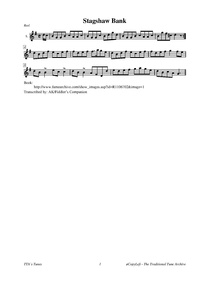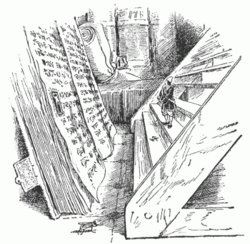TTA
|

Played by: Edric Ellis
Source: Soundcloud
Image: Proclaiming Stagshaw Fair at Corbridge, Northumberland." Ralph Hedley, 1882

The tune, as "Stagshaw Bank", also was entered into a c. 1887 manuscript compiled by the Society of Antiquities, entitled "Airs and dance tunes collected and constructed by the Melodies Committee of the Newcastle Antiquarian Society, 1857-1887," a compendium of their collecting work of local Northumbrian tunes over several decades.
Their work formed the basis from which much of the contents of Bruce & Stokoe's Northumbrian Minstrelsy is drawn, and continued for several years after the publication of that volume.
The tune is thought to be the work of Robert Bewick.
Stagshaw Bank Common is located just south of the Roman Wall in Northumberland.
For centuries it was the scene of two great annual fairs held on the day before Whit Sunday and on July 4th. From 1820 a third annual fair was held on November 24th.
The fairs gradually died out during the last half of the 19th century.
The following is an account of the fair c. 1850, written down in 1881 by Robert Forster[1]:
...
England for one day and for business people came to it from all parts of the United Kingdom. Besides horses, sheep, cattle, and swine, various articles of merchandise were offered for sale, consisting of men's hats, boots and shoes, these articles generally filled several stalls, the former being mostly from Hexham, and a considerable quantity of the latter from Corbridge. Jewellery and hardware stalls were prominent; saddlery and farming goods, such as hay rakes, forks, &c., were always plentiful; and always a large supply of cooperage goods, such as tubs, barrel churns, &c. Webs of cloth coarse and fine were shown to advantage on the green carpet by the side of the pond. The far-famed gloves, known as the "Hexham Tans", suitable for all purposes and for all classes, always formed noticeable articles of sale. Care was always taken by some thoughtful business man to make provision for the better part of man's nature. A great variety of useful books were shown, suitable for the most profound thinker as well as useful for the general reader. On the south side of the Horse Fair, in the distance you saw a strong made man somewhat elevated, with a crowd around him offering articles for sale; on approaching, we observe that it is Mr. C..... from the once famous Dog Bank, Newcastle, selling watches by auction, being for the most part forfeited pledges, the auctioneer assuring the public that each watch he offered was far superior to the one just sold, as once belonging to some squire or gentleman whose name was well known in the neighbourhood This man regularly attended the fair for many years and had his share of business. Amidst all this whirl of busy life, the "little busy bee" was not forgotten, for there was always a good supply of "bee skeps," to meet the wants of those whose were after the sweetness of honey in the comb. In all the articles named and others not named, the day being favourable, a good trade was done, in fact this was almost the only opportunity during the whole year that numbers of persons, especially from the outlying districts, had of obtaining them.
...
...more at: Stagshaw Bank Fair - full Score(s) and Annotations
X:1 T:Stagshaw Bank Fair M:C L:1/8 R:Reel S:Bruce & Stokoe – Northumbrian Minstrelsy Z:AK/Fiddler’s Companion K:G d/c/|BGGB cAAc|BGGc Gdbd|BGGB cAAc|Bge^c d3:| |:e|dBdg eceg|fdef gage|dBdg eceg|fdef g2 fe| dB B2 ec c2|dB B2 AFDd|edef gage|dBcA G3:|
|
One Year at The Traditional Tune Archive
Who Builds The ArchiveAlthough we are not trained musicologists and make no pretense to the profession, we have tried to apply such professional rigors to this Semantic Abc Web as we have internalized through our own formal and informal education.
|


